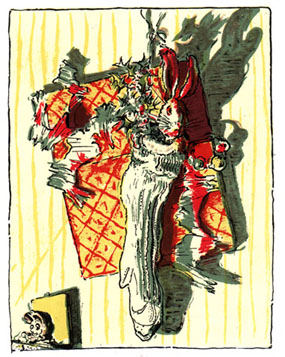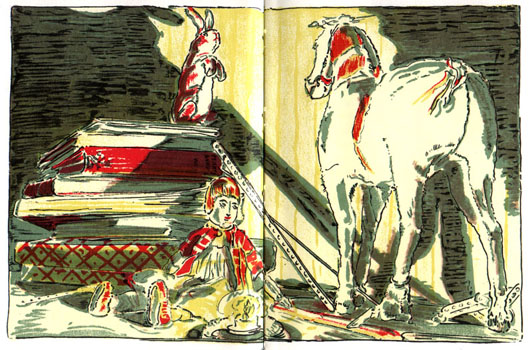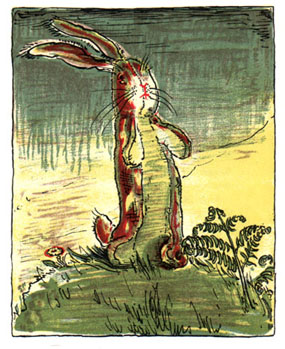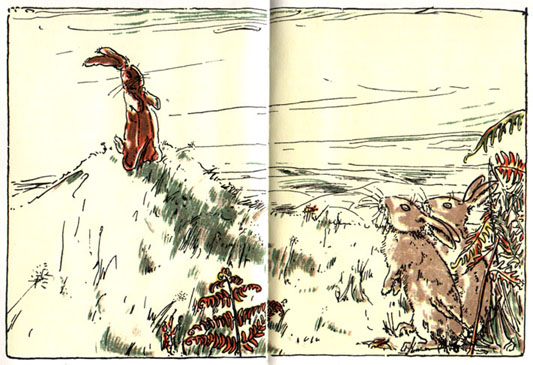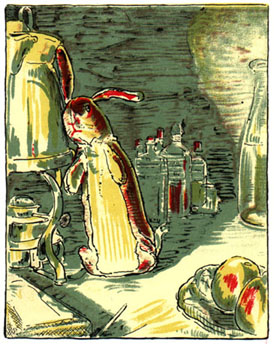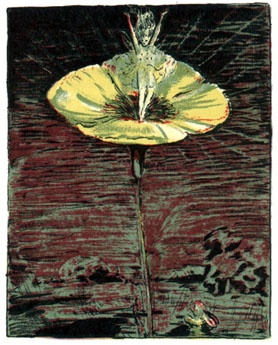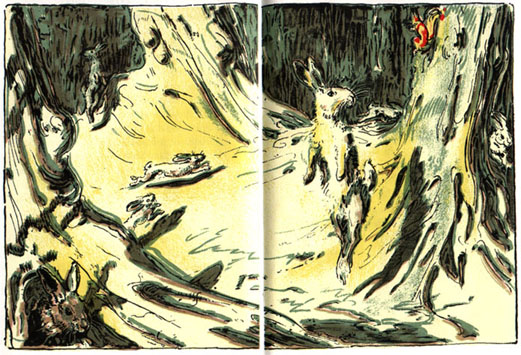To journalister ble utsatt for innbrudd, bundet fast og truet på livet, og skriver dette:
To utenlandske menn brøt seg inn kjøkkenvinduet midt på natta og holdt oss fanget i to timer, nakne og bakbundne i senga, mens de tvang til seg bankkort og koder og truet med å drepe oss. Den ene raneren ble pågrepet samme morgen, og vi fikk tilbake tjuvegodset. [...] Vi fikk som fortjent. Det sa i hvert fall en av dem, mens vi lå der kneblet med hodet i puta og ranerne over oss. Han hadde tydeligvis et behov for å forklare hvorfor de ranet oss. De var ikke onde mennesker, sa han. Bare i en fortvilet situasjon. [...] Den lange versjonen av den prosessen [med å forstp ranerne] har vi skrevet i boka Ubudne gjester. Men for å hoppe til konklusjonen. Ja, vi får som fortjent.
Min reaksjon var først å bli oppgitt. Det er kanskje et veldig rart ord å bruke, men på en måte synes jeg det er lettvint å si at de - som opplevde å bli ranet, bakbundet og truet på livet - oppfatter det som fortjent. Det er selvfølgelig deres rett å oppfatte det slik de vil; de er tross alt de som sto i sentrum for hendelsen.. Men:
Dersom de hadde blitt drept, hadde de fremdeles fortjent det?
Dersom en av ranerne hadde gått amok i Oslo og drept en lang rekke personer, hadde det vært fortjent? Hvor går grensen for det som hadde vært "fortjent."
Hva som er "fortjent" er ikke en målbar, konkret størrelse. Du oppfatter det på en helt annen måte enn jeg, og begrepet "fortjent" har blitt brukt til å forsvare eller unnskylde så utrolig mange groteske hendelser gjennom historien, at jeg synes man skal holde seg unna det begrepet så langt som mulig.
Dessuten: Hva innebærer det at dere synes at vi har fortjent det? Den eneste logiske konsekvensen av det må da være at dere synes at vi skal slutte å etterforske ran eller forbrytelser som er begått av flyktninger eller asylsøkere?
Det er lettvint å si at det er vår egen skyld, og dermed er det fortjent. Det er lettvint å bare legge seg ned og si mea culpa. Nei, det er ikke fortjent! Det er ikke fortjent for noen som har blitt ranet eller slått ned - ikke om de er slått ned av flyktninger eller av etniske nordmenn. Det er en meningsløs larm i en viktig diskusjon.
Og løsningen er i følge artikkelforfatterne? Å åpne grensene totalt - for grensene er jo tross alt streker som er trukket vilkårlig på et kart, ikke sant?
Er det ett politisk område som jeg ikke noensinne ville hatt lyst til å ta i med ildtang, er det innvandringspolitikken. Det er en fullstendig håpløs balansegang, for den vil alltid bli feil: Vi kan alltids diskutere hvor liberal innvandringspolitikken skal være, men den kan aldri bli liberal nok! Uansett hvor mange flyktninger og innvandrere vi tar imot, vil det alltid være tusener - millioner - som ikke får innpass. Det er ikke nødvendigvis noe argument for å gjøre asylpolitikken strengere, men det er viktig å forstå at asylpolitikk aldri kan representere løsningen! Å fjerne grensene er en utopisk, idealistisk tenkning som aldri ville fungert - det er vanskelig å se for seg det sosiale og økonomiske kaoset som det ville føre til i Europa, de enorme motsetningene det ville ført til, og hvordan det ville satt Europa helt ute av stand til - på kort OG lang sikt - å hjelpe de som virkelig trenger hjelp.
Asyl- og innvandringspolitikken MÅ sette kraftige begrensninger. Det er jævlig vondt, men det må være slik..
Fokuset må ligge på å hjelpe folk der de er, hjelpe dem med å bygge opp sine egne samfunn.. Men det høres da mistenkelig ut som FRP-politikk? Mnjaa... bortsett fra at det ser ut for meg som om FRP bruker ideen om å hjelpe folk "hjemme" som et påskudd til å ta inn langt færre flyktninger - og SÅ skjærer de i tillegg ned på bistandsbudsjettet. Det er dobbeltmoral, det!
Men har vi ikke noe ansvar??
Selvfølgelig har vi et ansvar! Vi har et enormt ansvar for å gi fattige land konkurransemuligheter på lik linje med rike land. Vi har et enormt ansvar for å sørge for at vestlige selskaper ikke raner med seg umåtelige verdier fra for eksempel råvarerutvinning i fattige land. Vi har et enormt ansvar for å ikke støtte de som undertrykker sitt eget folk - slik vestlige land har gjort i mange tilfeller når et har passet dem. Vi har et enormt ansvar for å bruke av vår rikdom for å hjelpe andre. Vi har et enormt ansvar for å - dråpe for dråpe - forandre prioriteringene i en verden som bruker vanvittig mange ganger så mye penger på våpen som vi bruker på mat til de som sulter. Det er en urett som er fullstendig vanvittig, og den eneste grunnen til at ikke flere tar tak i den, må være at uretten er så absurd stor at den er ubegripelig. Russland skal bruke omtrent 60 MILLIARDER DOLLAR på Olympiske Leker, dobbelt så mye som man regner med er nødvendig for å stille all sult i verden for ett år. Vi kaster ubegripelige mengder med mat hvert år..
Vi har et enormt ansvar for å forbedre forholdene for de som sitter årevis og venter på å få positivt eller negativt svar på sine asylsøknader - vi plasserer mennesker - mange barn - i en helt umenneskelig situasjon. Men å påstå at denne situasjonen gir dem rett til å rane, bakbinde og true, er å gjøre dem en enorm bjørnetjeneste. Jeg lurer på hvor mange asylsøkere som ville vært enige i dette?
Har vi grunn til å skjemmes? Herregud, ja! Vi kommer ikke unna å ta opp spørsmålene over, og det kan komme til å svi for oss. Men å si "Det er vår egen skyld at noen raner oss, og vi må bare åpne grensene fullstendig", er egentlig bare å unngå de store spørsmålene.

























